At the end of April 2023, I submitted my application to be a volunteer at the Paris 2024 Olympics. I originally heard about this program from our favorite (free) travel newsletter, The DailyDrop. The application took me about two hours and consisted of a few different parts.
After entering some basic information about myself, I was asked about: my experience in sports, preferences for events and stadiums, availability during the games, etc.
After that, there was a 200-question “test,” which was basically just a personality assessment and after I submitted it, it gave me some sample positions that I could be a good fit for based on my answers.
The last step was the ‘essay’ portion where I was asked to explain why I wanted to be a volunteer at the Olympics.
After this, there was nothing to do but wait until they started sending out offers in September 2023. I’m assuming the timeline will be pretty similar for both Milan Cortina 2026 and LA 2028.
IMPORTANT: The Milan Cortina 2026 application is DIFFERENT than Paris. Read more below.
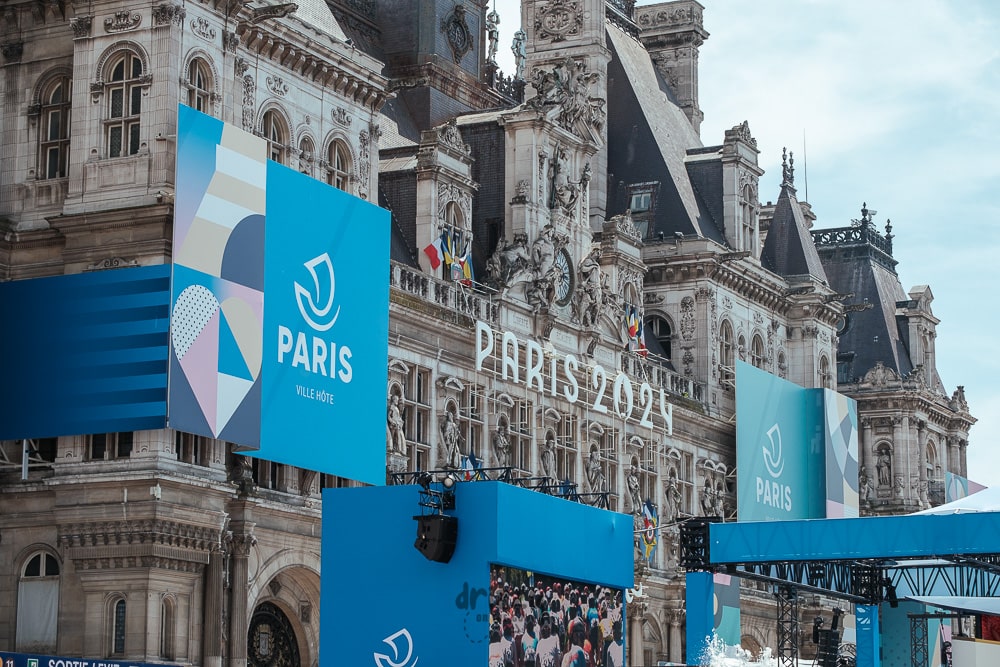
Road to Paris
Isabelle and I had just gotten back to Germany after an epic 4-month backpacking trip in Southeast Asia.
Isabelle stayed in Germany, and I hopped on a bus from Stuttgart to Paris to volunteer at the Paris Olympics. It all felt like a dream at this point.
At this point, I knew that I was on the Transportation Team, stationed at the Nautical Stadium for water sports – this information was given to us with the offer letter.
Over the next four weeks, I was immersed in one of the world’s largest events, an experience I’ll never forget.
From holding the Olympic Torch, to making friends from every continent and talking strategy with coaches or trading pins with athletes… every single day reminded me why I was so happy to be a part of it.
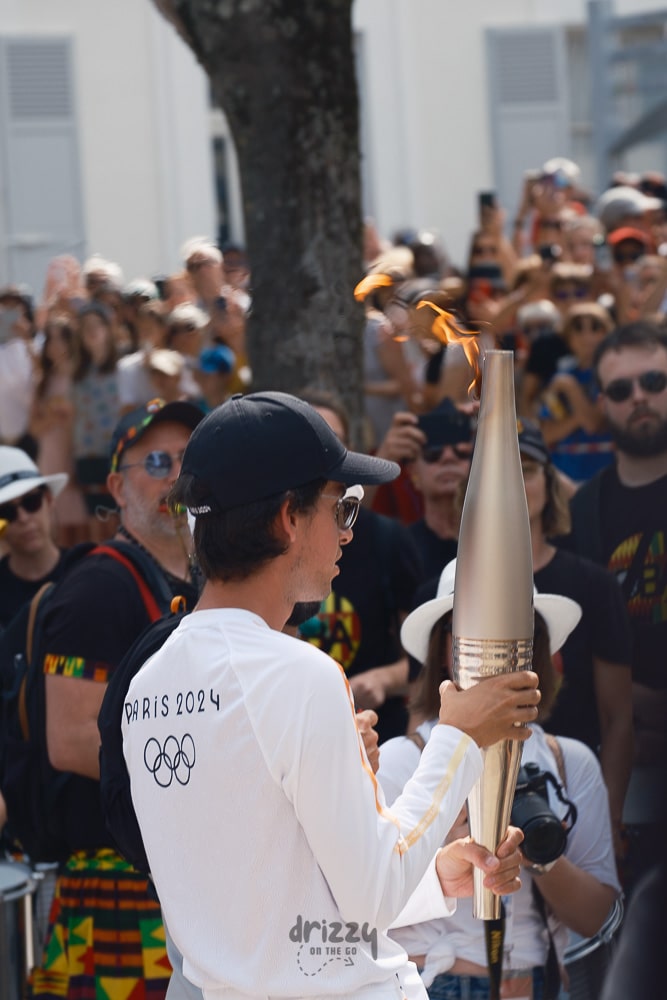
The Olympic Torch heading through Lagny-sur-Marne
The Offer Letter
Towards the end of November, I woke up to an email offering me a role on the Transport Team at the Nautical Stadium from June 16 to July 13.
I accepted the offer, and then there wasn’t much to do except wait for the next instructions.

Training
A few months later, I started receiving online trainings from the volunteer portal.
There was two live online seminars (via Zoom @ 6pm Paris time), in which we learned more general knowledge about the Olympics and the role of a volunteer.
I also had two virtual trainings, each taking around an hour. The first one was more general, and the second was specific to my role on the transport team. It was just enough information to where I felt good about my volunteer role, but not information overload like when you start a new job.
Life as a Volunteer
I won’t lie – life as an Olympic volunteer is busy (but so worth it). Once the games started, I worked 6 days per week, each shift lasting about 6-8 hours.
Keep in mind: there are TONS of positions at the Olympics, so everyone’s day will look a little different.
Typical Day in the Life (working the morning shift):
5 AM: Wake up, eat breakfast, get ready for the day.
6 AM: Get to the stadium. Luckily, I was able to find accommodation just one train stop away from the nautical stadium, so my total commute was only 30 minutes.
6:30-12 PM: Shift begins. There were two parking lots, and we would switch halfway through our shift. I was free to take breaks for coffee and snacks whenever.
12 PM: Lunch time. We were provided one meal per shift.
1-2PM: Shift would end in this hour.
2 PM: Head back to my accommodation.
3 PM: Decided what I wanted to do with my day, I was in France after all!
If I felt adventurous, I would head into Paris. However, I found myself very comfortable in Lagny-Sur-Marne, and enjoyed cooking at home (still budgeting as best I could). The town itself was very nice, and a bit quieter than Paris – especially during the Olympics.
Midday & Evening Shifts (for transport)
There were also afternoon shifts (1-8 PM) and evening shifts (5-11 PM). It sometimes made it hard to get into a set sleep schedule, but because there were so many different shifts and tons of volunteers, I was meeting new people every single day, up until my last shift as a volunteer.
The transport team had to be the first ones to arrive and the last to leave. Remember, every volunteer role is different, and therefore has different scheduling necessities.

A typical schedule once the games started – as you can see, it was busy!
Follow Us 🙂
Be the first to hear about our latest adventures and new locations!
Related Post
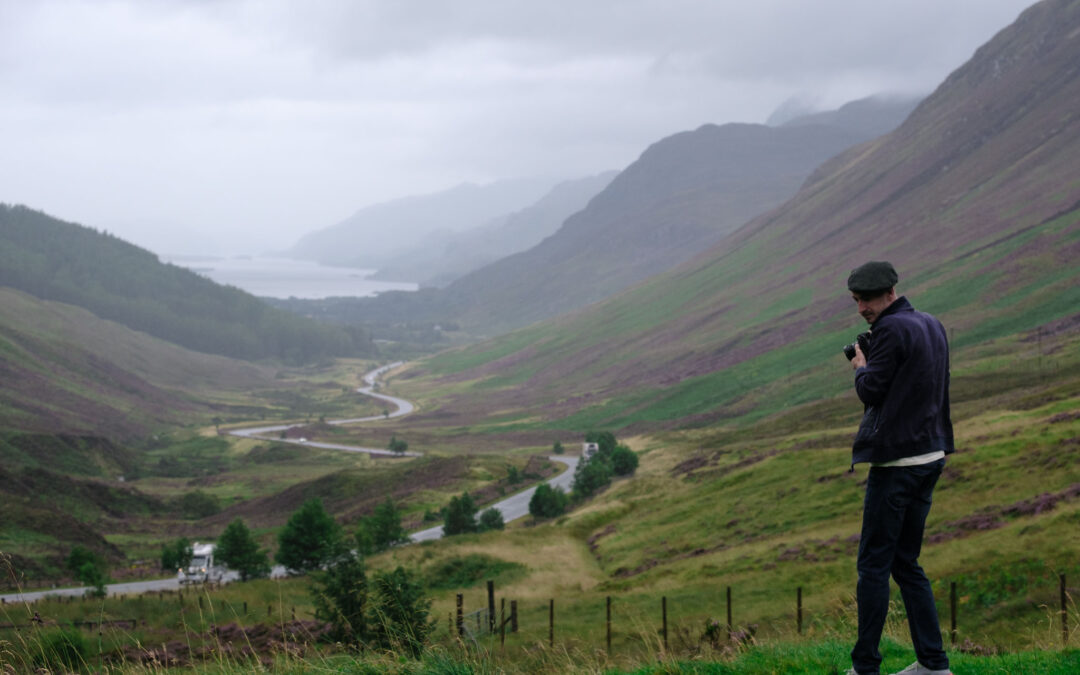
The Ultimate Scotland Roadtrip: A Guide Through Edinburgh and the Scottish Highlands
Scotland is loved by so many for its stunning landscapes filled with purple heather, mossy mountains, large lochs and hairy coos. But what’s the best way to explore it? What should you eat? Is the famous Loch Ness and Isle of Skye worth it?
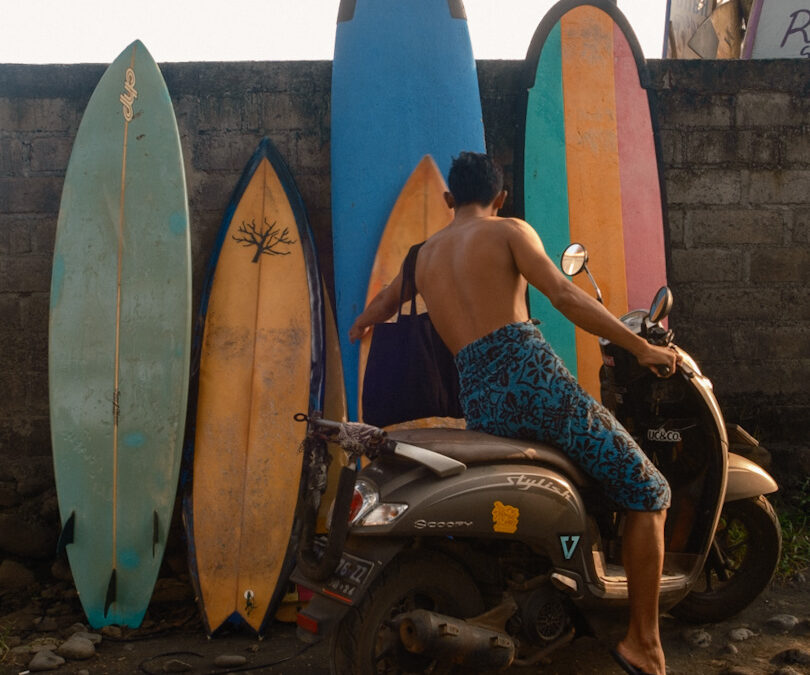
A Unique Bali Roadtrip Guide: The Perfect Way to Explore 2024
Ready for a Bali adventure like no other? From scenic routes to off-the-grid destinations, this guide is your key to exploring Bali’s untouched beauty on a 150CC motorbike.
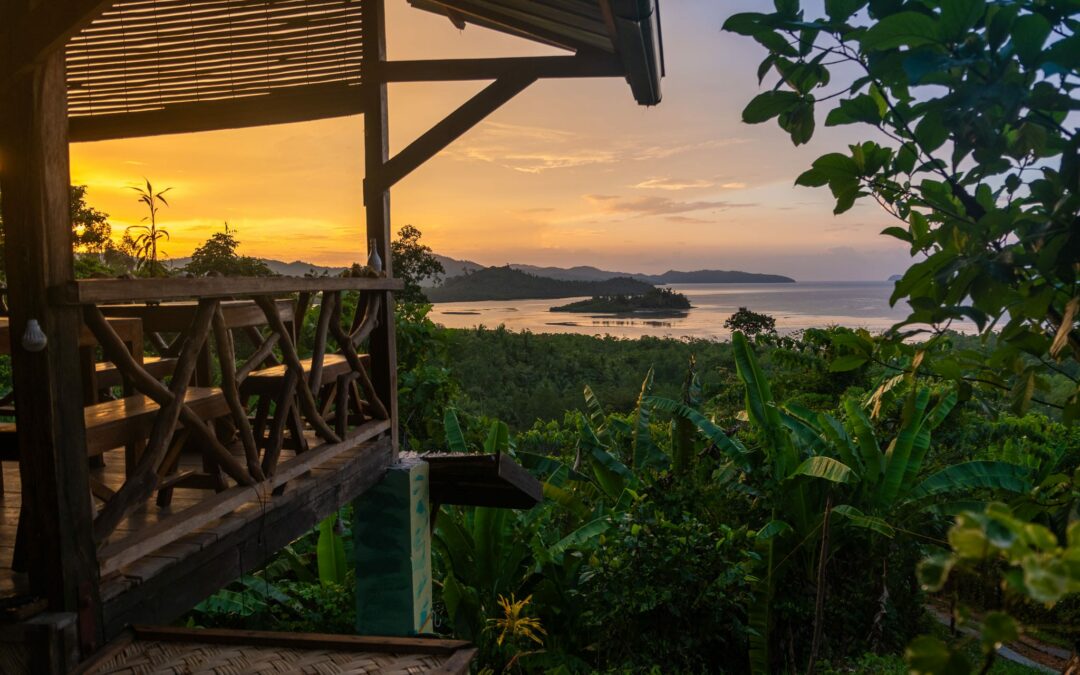
The Best Eco-Friendly Stay in Port Barton, Palawan 2024
A beautiful eco-lodge nestled in the corner of a small laid-back town, Port Barton. A relaxed stay with delicious food, friendly staff, and a beautiful beach down the road.
Milano Cortina 2026
EXCITING NEWS! The Milano Cortina 2026 Olympics Volunteer application is LIVE. So after you finish reading this, GO APPLY.
Milan and Cortina d’Ampezzo will be hosting the 2026 Winter Olympic Games, which will take place from February 6 to March 15. Similarly to Paris, there will be 8 beautiful venues located across Northern Italy – which also happens to be Isabelles and my favorite part of the whole country.
Three regions: Trentino Alto Adige, Lombardia & Veneto
As a result, events, athletes, and volunteers will be spread throughout the two regions: Alto Adige and Veneto.
IMPORTANT: to volunteer at the Winter 2026 Olympics, there are THREE main criteria.
You must:
(1) speak English OR Italian
(2) be at least 18 years old by November 1, 2025
(3) be available for at least 9 days during the games
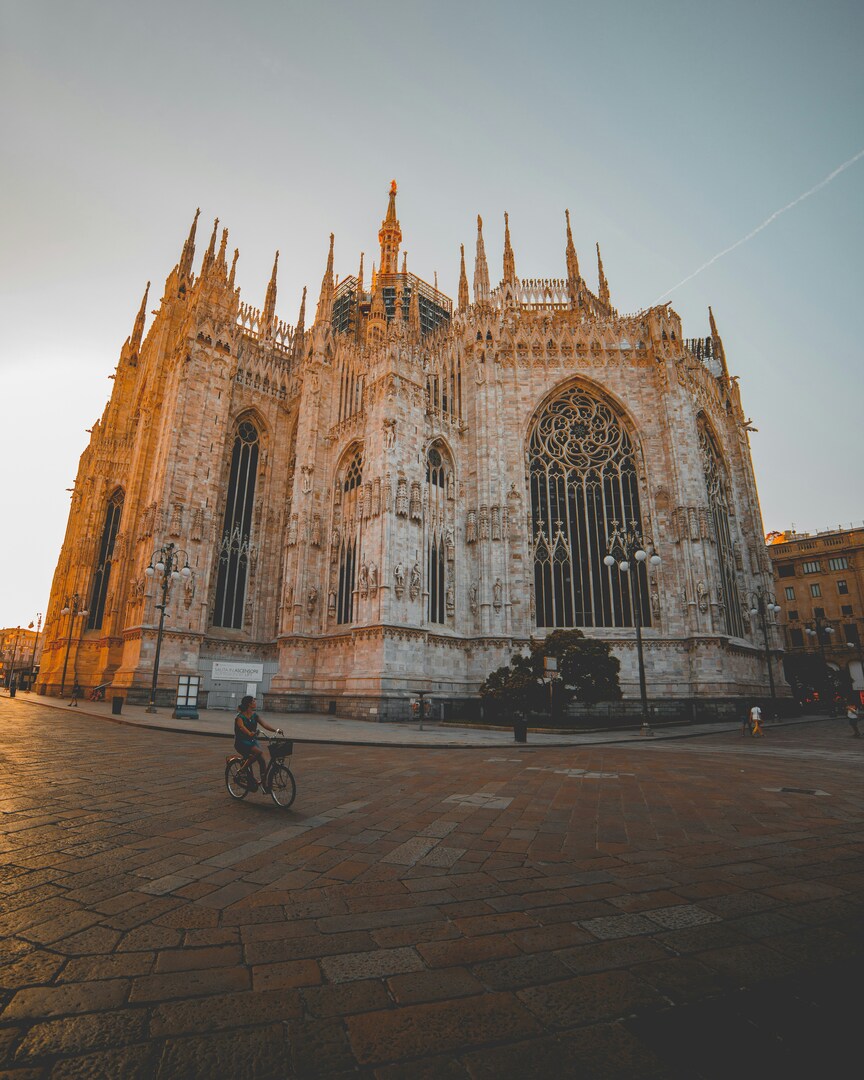
Tips for Applying
The 2026 Olympics made the application very straightforward with only 8 simple sections, and it only took me around 30 minutes to fill out.
SURPRISE! There is NO 200-question assessment, unlike the Paris application.
Here’s some helpful tips to keep in mind while filling out your application:
- Stick to what you know: Many of the volunteers at the Nautical Stadium, myself included, had previous experience with water sports. So, for example: if you have experience with ice hockey, request the town with Ice Hockey. Choose roles that align with your background. But, if you just LOVE a sport – maybe you watched ice hockey on TV a lot or whatever it may be, talk about that. The most important trait after all is passion.
- Choose your location preference wisely: First, look at what events are happening in each city. If you have experience with a certain event, then make sure you request that city. Also, think about traveling to each place, and make sure it is feasible for you to do so. It is much easier to get to the cities than the towns in the mountains. (Milan, Cortina, Tesero & Verona will be most accessible). SEE VENUE INFO HERE
- Give accurate availability: If you receive an offer from the Olympics, it will include your role and the days they need you. If you say you’re available for four weeks, make sure you can commit to those four weeks. If you’re available for the minimum 9 days then make sure you can do that as well. If you can’t fit their timeframe, there’s a good chance you won’t get another opportunity.
- They read every short answer: The short-answer response is your chance to really vouch for yourself, and yes, they do read every answer – at least enough to know what events you should be placed at. This is partly why there’s a delay in sending out offers. If you lack experience in sports but love the Olympics or have expertise in a specific area, this is your chance to highlight it! The short answer is only 500 characters this year instead of 4,000, so get to the point quickly. (For reference, in my Paris 2024 application I talked a lot about growing up canoeing & being a rafting guide, and then I was placed at the nautical stadium).
- DON’T LIE: This is a good rule to follow in life and also very important for this application. For the Paris Olympics some people were interviewed because of the information they listed on their application, so don’t state you have the experience you don’t have.
PRO TIP: do NOT say you can speak Italian on the application if you actually can’t – you are not going to be thrilled when you’re placed on a team of people who only speak Italian. English is an official language of the Milan Olympics, so as long as you speak English OR Italian – you’re golden!
Other Positions
These definitely aren’t the correct official names, but it’s what I would call them:
- Break Room Support
- Anti-Doping Team
- Field of Play (requires experience in the sport)
- Olympic Family Support
- Driver
- Stadium Spectator Helper (a great position because you can watch all the events!)
- Olympic Village Support
Each position will have a different schedule. Some positions are only needed while the events are happening, while others are required at all times, so it’s hard to predict what your schedule will be.
However, I can almost guarantee you’ll be busy during your time there. While you are a volunteer, you are still expected to fulfill your role and be reliable.
Free Time in Your Host City
Yes, the Olympics will keep you busy, but you’ll also have time to explore on your own (or with a new volunteer friend). You’ll meet plenty of people from the host city, so be sure to ask them for recommendations on places to eat and visit.
If possible, I HIGHLY recommend staying a few extra days after your shifts end to soak in the Olympic atmosphere.
Here’s a few recaps of my time at the Paris Olympics to help guide your decision:
Tips for Future Volunteers
- Respect Athletes: during the day, you will inevitably run into athletes and coaches, and you are more than welcome to interact with them. However, make sure it is an appropriate time. If an athlete is in full uniform and looks like they are preparing to race, don’t approach them asking for photos or pins. Be respectful.
- DON’T EXPECT FREE EVENTS: yes, you may have the opportunity to see some events for free, and it’s incredible if you do. However, it is not guaranteed, so don’t apply with the expectation of a free trip to Olympic events.
- Learn Basic Words in the Other Language: to volunteer at the 2026 Olympics in Italy, you must speak either Italian or English. If you speak one but not the other, learn some basic phrases in the other language. I don’t speak French, but learning a few basic words and sayings—such as “hello,” “thank you,” “how are you,” and “left/right”—isn’t difficult. The extra effort goes a long way.
- Finding Accommodation: I used Airbnb for my accommodation during the Olympics. I had to switch apartments halfway through volunteering but both places were private stays and only one train stop from my venue. I was about a 20-minute train ride into Paris, so I didn’t have the best location, but both places averaged around $47/night which I was really happy with. There were a lot of new Airbnb’s listed specifically for the Olympics, so if you don’t find something right away just keep checking periodically.
- Cost: The most common questions I was asked during the Olympics were about money, so I will clarify a few things. The Olympics does not cover transport to your host city, and they do not cover accommodation. These will be your two most expensive items. Prices will be elevated during the games, so look at what current travel prices to Milan from your location are and know they will be more expensive than that. I talk about cost in this video.
- The Volunteer Uniform: Every volunteer is given a full uniform to wear during their shifts, and yes, you can keep it after the games. Watch this video to see the full uniform.
- Pins: the pin-trading culture was something I didn’t understand before arriving at the Olympics. I’m not sure where or why it began, but athletes trade their country pins with others. If you want to accumulate some pins (which make for great souvenirs), bring some to trade. Don’t ask athletes for pins without offering something in return.
- Check out our Tiktok: For more detailed Olympic coverage, go check out the videos I posted during the games!
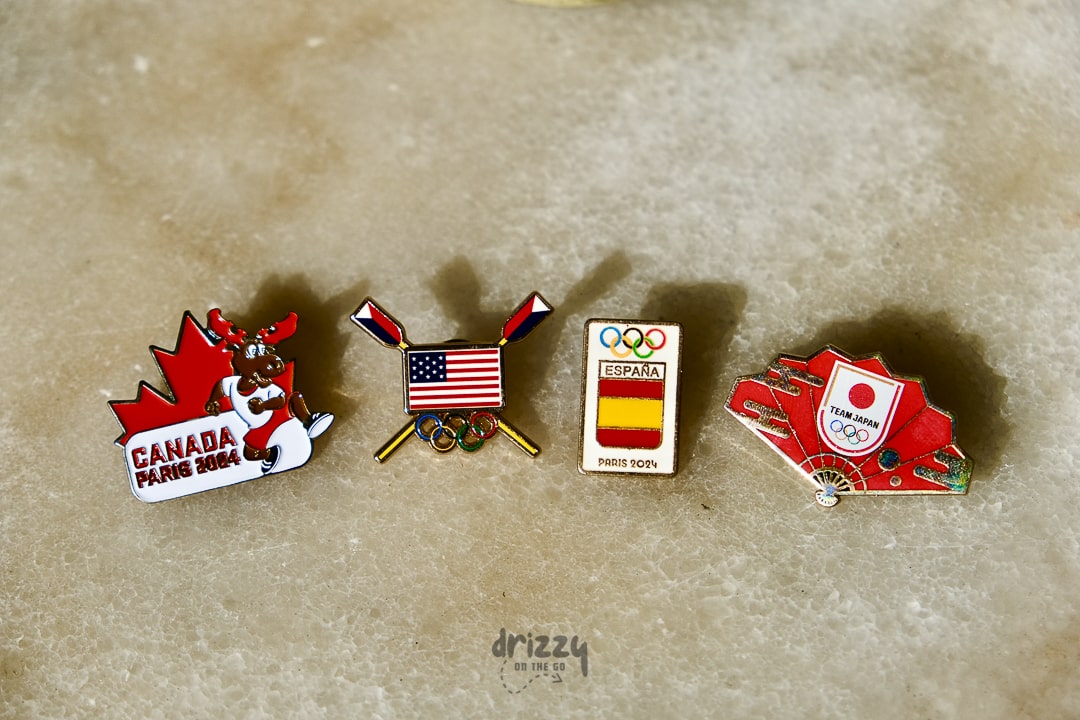
Just some of the pins I collected during the Paris 2024 Olympics
Is It Worth It?
Absolutely. I’ve always loved the Olympics, and being part of the games was an incredible experience. Growing up, I always assumed that if I were involved in the Olympics, it would be as a competitor, but this experience was (almost) just as cool.
Committing your time to volunteer, especially during your vacation, might not sound all dazzling. But I can guarantee that you’ll remember being part of the Olympics far more than just another holiday.
Plus, you’d be in freaking Italy (or LA) – both are amazing locations.
It’s a unique opportunity that very few people in the world get to experience—so I urge you to apply and give it a shot.
APPLY HERE. And GOOD LUCK!
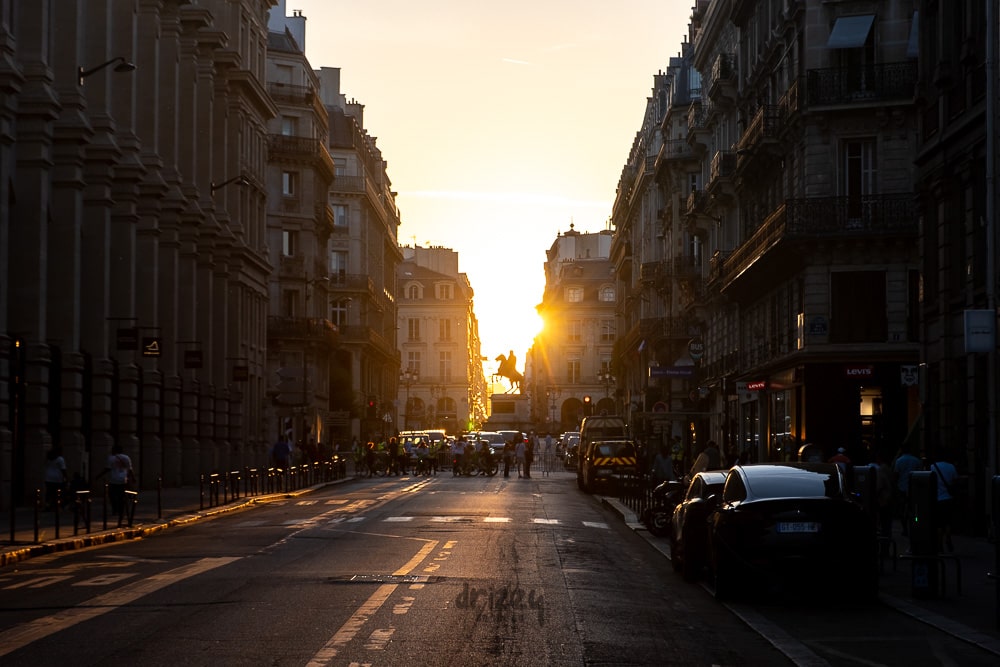
Sunset in Paris

0 Comments